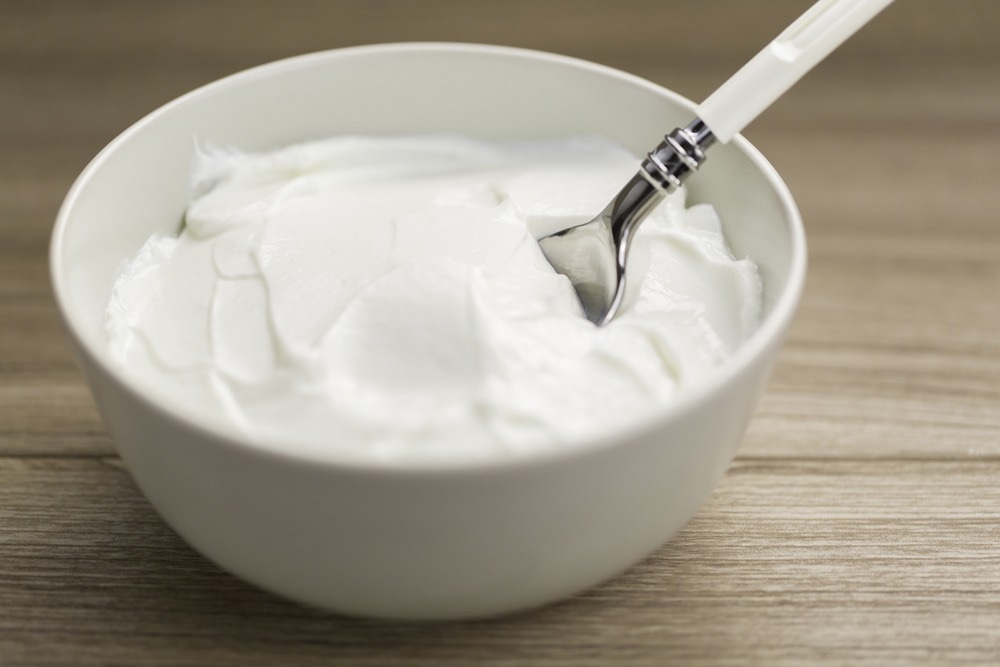Food fortification with supplements improves the quality and quantity of the nutrients in food. An article published in the journal Scientific Reports presented the preparation of microcapsules loaded with selenium (Se) nanorods and probiotics to enhance the nutritional content of stirred yogurts.

Study: Designated functional microcapsules loaded with green synthesis selenium nanorods and probiotics for enhancing stirred yogurt. Image Credit: Anastasios71/Shutterstock.com
The Se nanorods were prepared from Aloe vera leaf extract via green synthesis and were analyzed for their size, morphology, antimicrobial activity, and activation of microcapsules for probiotics. The results revealed that Se nanorods were stable with a diameter between 12 and 40 nanometers, exhibited an antimicrobial effect, and improved the count of probiotics.
The microcapsules were loaded with varying concentrations of Se nanorods (0, 0.05, and 0.1 milligrams per 100 milliliters) and probiotics (Bifidobacterium lactis and Lactobacillus rhamnosus), had irregular shape and efficiency between 95.25 and 97.27%. These microcapsules could resist the degradation by gastrointestinal juices and showed a minor inhibition effect against Caco-2 and HepG-2 cell lines.
The microcapsules loaded with Se nanorods were integrated into stirred yogurt and examined for 30 days. The results revealed that the count of probiotics, total solids, acidity, and ash values increased in the yogurt samples without altering fat and protein contents. The yogurt with Se nanorods and probiotics-loaded microcapsules had high acceptability and no alterations in its odor, body, color, or appearance.
Nanorods and Probiotics
Fortification of dairy products with dietary minerals like Se will prevent diseases related to nutritional deficiencies. Besides decreasing the risk of cardiovascular and thyroid disease, Se helps prevent cancer due to its effects on the immune system and DNA repair.
Nanorods are nanostructures that are extensively used in fundamental and applied research. These nanomaterials may be prepared from carbon, gold, zinc oxide, and many other materials and are larger in size than individual atoms and small molecules.
Due to their shape anisotropy (physical properties), nanorods serve as ideal candidates for many applications. Compared to spherical nanoparticles, nanorods have enhanced ability for the excitation of surface plasmons due to their increased aspect ratio.
Additionally, the enhanced surface plasmons increase the movement of electrons within nanorods. Therefore, an increase of surface plasmons leads to the enhancement of the electrical field in nanorods compared to spherical particles.
Probiotics are a group of microbes associated with food to enhance their nutritional value and maintain gut health. Probiotics are highly promoted for their ability to support gastrointestinal health and strengthen the immune system. Currently, the consumption of probiotic cells via food products is in high demand. Probiotics are also considered functional foods that are foods that look like traditional foods yet have established physiological benefits.
Microcapsules Loaded with Se Nanorods and Probiotics for Enhancing Stirred Yogurt
The present work synthesized Se nanorods from Aloe vera leaf extract via green synthesis. The Se nanorods and probiotic strains (Bifidobacterium lactis and Lactobacillus rhamnosus) were loaded into microcapsules and characterized via the extrusion method.
The stirred yogurts supplemented with Se nanorods, and probiotic-loaded microcapsules were investigated for 30 days to determine their chemical, sensory and microbiological properties. Analyzing the chemical properties of microcapsule-fortified stirred yogurts revealed that the total solids and ash content in the yogurts increased due to increased acidity. However, the 30 days storage period did not alter the acceptability of stirred yogurts supplemented with microcapsules.
The Se nanorod and probiotic-loaded microcapsules showed anti-proliferative activity against Caco-2 and HepG-2 cell lines. The microcapsules concentration of 1000 micrograms per milliliter showed 44.26 and 37.46% inhibition against Caco-2 and HepG-2 cell lines, respectively. Moreover, pure green Se nanorods showed high antimicrobial against both gram-positive and gram-negative bacteria.
Testing the release of probiotics from microcapsules in a simulated colonic solution revealed that the release of probiotics into the colonic solution was initiated during the first hour, followed by a maximum probiotic count in the colonic solution in 4 hours. Thus, the present work revealed the potential of functionalized microcapsules in fortifying dairy products to enhance the nutritional content.
Conclusion
In summary, Se nanorods were prepared from Aloe Vera leaf extract via green synthesis. The as-prepared green Se nanorods were stable and were in the diameter range between 12 and 40 nanometers. The antimicrobial activity exhibited by these nanorods was more against Gram-negative than Gram-positive strains and could activate different probiotic strains at low concentrations (0.05 and 0.1 milligrams per 100 milliliters).
Microcapsules loaded with Se nanorods and probiotics had an irregular and rough surface and showed efficiency in the range of 95.25 and 97.27%. The microcapsules were resistant to digestion in the gastrointestinal system, showing maximum probiotic counts after 4 hours in stimulated colonic solution.
The microcapsules with Se nanorods and probiotics showed 44. 26 and 37.46% inhibition against the proliferation of Caco-2 and HepG-2 cell lines, respectively, at the concentration of 1000 micrograms per milliliter. Also, the microcapsules introduced into stirred yogurt resulted in increased probiotic counts, high acidity, total solids, and ash content.
Reference
El-Sayed, H.S., El-Sayed, S.M., Youssef, A.M. (2022) Designated functional microcapsules loaded with green synthesis selenium nanorods and probiotics for enhancing stirred yogurt. Scientific Reports, 12, 14751. https://www.nature.com/articles/s41598-022-18781-w
Disclaimer: The views expressed here are those of the author expressed in their private capacity and do not necessarily represent the views of AZoM.com Limited T/A AZoNetwork the owner and operator of this website. This disclaimer forms part of the Terms and conditions of use of this website.